|
|
|
Sort Order |
|
|
|
Items / Page
|
|
|
|
|
|
|
| Srl | Item |
| 1 |
ID:
025440
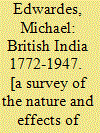

|
|
|
|
|
| Publication |
London, Sidgwick & Jackson, 1967.
|
| Description |
vii, 396p.: ill.hbk
|
|
|
|
|
|
|
|
|
|
|
|
Copies: C:1/I:0,R:0,Q:0
Circulation
| Accession# | Call# | Current Location | Status | Policy | Location |
| 015873 | 954.03/EDW 015873 | Main | On Shelf | General | |
|
|
|
|
| 2 |
ID:
134106
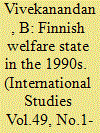

|
|
|
|
|
| Publication |
2014.
|
| Summary/Abstract |
Finland has an advanced welfare state system, which extends social protection for everyone in the country. The system is anchored in a full-employment policy, a steeply progressive taxation system, and a strong, benevolent and resourceful state, endowed with the authority to regulate the economic and social life of people. This system has been established through the institutionalization of various social insurance schemes and schemes for pensions, health care, childcare, free and compulsory education, etc. In the 1990s, the Finnish state experienced an economic crisis, borne out of flawed economic reforms like the deregulation of the financial market and other changes that aimed at hastening Finland's European Union (EU) membership. The crisis forced the government to tighten the preconditions for availing of welfare benefits. Some notable changes made during the crisis have not yet been rescinded even after it ended. Nevertheless, the crisis underlined the value of the welfare state system in helping ordinary people to successfully insulate themselves against any serious hardship during the period. As a result, the system is very popular in Finland. The Finnish welfare system today faces new challenges emanating from globalization, the EU, demographic changes and structural unemployment.
|
|
|
|
|
|
|
|
|
|
|
|
|
|
|
|
| 3 |
ID:
157125
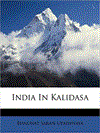

|
|
|
|
|
| Publication |
New Delhi, Life Span Publishers and Distributors, 2018.
|
| Description |
xvi, 385p.hbk
|
| Standard Number |
9789381709771
|
|
|
|
|
|
|
|
|
|
|
|
Copies: C:1/I:0,R:0,Q:0
Circulation
| Accession# | Call# | Current Location | Status | Policy | Location |
| 059287 | 891.2/UPA 059287 | Main | On Shelf | General | |
|
|
|
|
| 4 |
ID:
134125
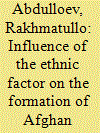

|
|
|
|
|
| Publication |
2014.
|
| Summary/Abstract |
The formation of a unified state in Afghanistan is deeply affected by the many ethnic contradictions that are greatly hindering its current development. They primarily relate to building a multiethnic state, the traditional domination of the Pashtun feudal elite in the power structures, the place and role of the non-Afghan peoples in the country's economic and political life, and the relations among the main ethnic groups that populate the country.
This article examines the sources of these ethnic problems as the centralized state completed its formation in Afghanistan and how they are expressed in the country's current historical mythology.
|
|
|
|
|
|
|
|
|
|
|
|
|
|
|
|
| 5 |
ID:
134124
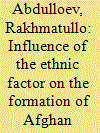

|
|
|
|
|
| Summary/Abstract |
The formation of a unified state in Afghanistan is deeply affected by the many ethnic contradictions that are greatly hindering its current development. They primarily relate to building a multiethnic state, the traditional domination of the Pashtun feudal elite in the power structures, the place and role of the non-Afghan peoples in the country's economic and political life, and the relations among the main ethnic groups that populate the country.
This article examines the sources of these ethnic problems as the centralized state completed its formation in Afghanistan and how they are expressed in the country's current historical mythology.
|
|
|
|
|
|
|
|
|
|
|
|
|
|
|
|
| 6 |
ID:
108931


|
|
|
| 7 |
ID:
185286
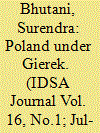

|
|
|
| 8 |
ID:
111229
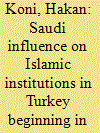

|
|
|
|
|
| Publication |
2012.
|
| Summary/Abstract |
This article investigates the influence of Saudi Arabia on aspects of Islamic social, political, and economic life in Turkey. Since the 1970s, long before the rise of the Justice and Development Party (AKP) of today, Turkish-Saudi Arabian relations have been characterized by an increasing degree of cooperation, solidarity, and partnership centered on certain economic, diplomatic, social, and cultural activities with a good deal of Islamic content. Turkey's orientation toward the Middle East in general and Saudi Arabia in particular traces to the global oil crisis that started in 1973 and its severe effects on the Turkish economy; it also stems from some of Turkey's foreign policy goals with regard to the Cyprus issue and its relations with regional and global actors. Examples of Saudi influence have included the involvement of Saudi-based non-governmental organizations (NGOs) and multinational corporations (MNCs) in Turkey, Turkey's membership in the Organization of the Islamic Conference (OIC), and Turkish labor migration to Saudi Arabia, with a spillover effect in a wide range of other arenas. This particular aspect of Turkish-Saudi Arabian relations is analyzed using the theory of complex interdependence, which underscores the importance of economic, social, and cultural issues in international relations in addition to that of traditional political, diplomatic, and military goals.
|
|
|
|
|
|
|
|
|
|
|
|
|
|
|
|
|
|
|
|
|